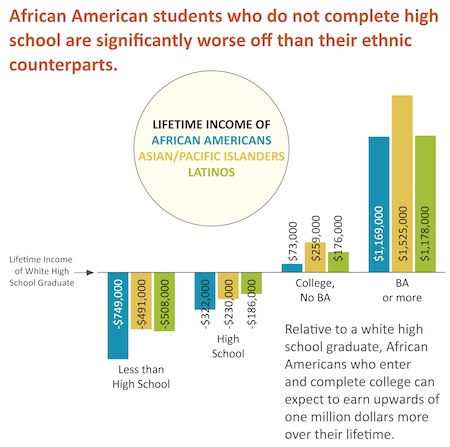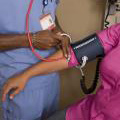A College Education Provides Major Economic Benefits for Blacks in California
The report found that lifetime earnings for African Americans with a four-year college degree in California have grown 85 percent, after adjusting for inflation, over the past 30 years.
Addressing the Racial Divide in STEM Education
The data suggests that attracting Black students to STEM fields is not the problem but keeping them there is a major concern.
New Data Shows a Wide Racial Disparity in the GPAs of College Graduates
Whites were more than twice as likely as Blacks to graduate with grade point averages better than 3.5. Blacks were nearly three times as likely as Whites to graduate with a GPA of less than 2.5.
Black First-Year Students at the Nation’s Leading Research Universities
For the sixth year in a row, Columbia University in New York City has the highest percentage of Black first-year students among the 30 highest-ranking universities in the nation.
A Check-Up on Black Progress in Nursing Degree Programs
According to data from the American Association of Colleges of Nursing, Black have made tremendous progress over the past decade in increasing their percentage of students in bachelor's, master's, and doctoral degree programs in nursing.
New Report Shows That Blacks Are Doing Poorly in Los Angeles County Schools
The report concludes that "if current trends continue, only 1 in 20 of today’s African-American kindergartners will go on to graduate from high school and complete a degree at a four-year California university."
HBCUs Hit Hard by NCAA Sanctions
Eighteen teams were penalized for the poor academic performance of their student athletes by being declared ineligible for postseason competition in the 2013-14 academic year. Of these 18 teams, 15 were teams at historically Black colleges and universities.
University Project Aims to Restore Minorities’ Trust in Medical Research
A new project at the University of Maryland, entitled Building Trust Between Minorities and Researchers, offers information targeted at minorities about participation in research and clinical trials.
How the Ban on Race-Sensitive Admissions Impacts Black Enrollments at the University of Michigan
In order for racial parity to prevail in Michigan, the number of Black students in the entering class at the University of Michigan would have to nearly triple.
The Persisting Racial Gap in College Student Graduation Rates
In 2013 the graduation rate for Black students at the nation's largest universities that participate in the National Collegiate Athletic Association's Division I is 44 percent. This is 22 percentage points below the rate for Whites.
Making Racial Health Disparities an Issue of Social Justice
The Social Equity Leadership Mobilization Alliance is a consortium established to mobilize the next generation of leaders in the public health field. Harvard, Brown, and Morehouse are members of the alliance.
No Progress in Closing the Racial Gap in Doctoral Degrees
In 2012, African Americans earned 2,079 doctoral degrees. This was 6.3 percent of all doctoral degrees awarded to U.S. citizens and permanent residents. In 2002, African Americans also earned 6.3 percent of all doctoral degrees.
The University of Pennsylvania’s Major Effort to Boost Faculty Diversity
Since the year 2000, the percentage of all faculty at Penn who were racial or ethnic minorities increased from 12.8 percent to 20.5 percent. But President Amy Gutmann says, "We still have more work to do."
Racial Differences in Educational Debt Levels for Doctoral Students
Blacks who earned doctorates in 2012 had an average of $54,132 in debt from educational loans. Whites who earned doctorates had average educational debts of $25,992.
The Racial Gap in College Graduation Rates
At publicly operated colleges and universities, 39.7 percent of Blacks earned their bachelor's degrees within six years from the same institution at which they enrolled in 2006 compared to 60.2 percent of Whites.
A Call to President Obama to Include Girls of Color in “My Brother’s Keeper”...
In an open letter to President Obama, a group of 1,000 women of color state that "the crisis facing young boys of color should not come at the expense of girls who live in the same households, suffer in the same schools, and endure the same struggles."
Ten Universities to Tackle the Problem of K-12 Teacher Diversity
The American Association of Colleges for Teacher Education has selected 10 universities to participate in a program with the goal of increasing the number of Black and other minority men who teach in the nation's public schools. Only 2 percent of public school teachers are Black males.
Black Degree Attainments in Engineering: Long Way to Go to Reach Parity
In 2005, Black earned 5.3 percent of all bachelor's degree awarded in engineering. In 2012, Blacks earned only 4.2 percent of all bachelor's degrees awarded in the discipline. Blacks did slightly better in graduate degrees in engineering.
University of Utah Project to Provide Prenatal Care to African Refugees
Aster Tecle, an assistant professor of social work, will co-lead The Perinatal Community Health Workers to Support African Refugee Women and Families that will train other African women to provide appropriate information, assistance, and prenatal care.
New ACT Test Results Show Very Few Black Students Are Prepared for College
According to the 2014 scores on the ACT college entrance examination, only one in 20 Black students were rated college-ready in all four areas: English, reading, mathematics and science. Whites were nearly seven times as likely as Blacks to be college ready in all four areas.
Stanford Study Examines the Reasons Behind Racial Disparities in School Discipline
In controlled experiments, the researchers found that the stereotype of black students as "troublemakers" led teachers to want to discipline Black students more harshly than White students.
New Study Finds No Progress in Increasing Black Faculty in Chemistry
African Americans make up just 1 percent of the chemistry professors at the 50 U.S. colleges that have the largest budgets for chemical research. Thirty of these 50 schools have no Black chemistry faculty.
A Sharp Rise in Suicide Among Young African Americans
The study, led by scientists at Ohio State University, discovered that the overall suicide rate remained stable over the past 20 years but this obscured a significant increase in suicide incidence in Black children and a significant decrease among White children.
Stanford University Study Documents the Racial Gap in Neighborhood Affluence
The research found that Black families with an income of $50,000 live in a community where the average income is $42,579. Whites with an income of $50,000 live in a community where the average income is $53,000.
A Large Racial Gap Persists in ACT Test Scores
The average score for Blacks on the ACT college admissions test in 2015 was lower than for any other racial or ethnic group including American Indians, Hispanics, and Pacific Islanders. The racial gap in ACT scores has remained relatively constant for many years.
The Growing Racial Gap in SAT Scores
Since 2006 when the SAT college entrance examination was revised, the racial scoring gap on the combined reading, mathematics, and writing sections of the SAT has increased by eight points.
Yale Students Debut Website Aimed at Ending Racial Disparities in Healthcare
Student interns at the Center for Engineering Innovation and Design at Yale University have developed SpokenMed, an information healthcare website aimed at members of minority groups who are often ignored by traditional health resources.
A Check-Up on the Racial Gap in Medical School Applications and Enrollments
In 2015, the number of Black applicants to U.S. medical schools was up a whopping 16.8 percent from 2014. Blacks were 7.6 percent of all medical school matriculants in 2015. This was up from 6.9 percent in 2014.
Study Shows That Athletes Make Up Huge Percentages of Black Students at Many Universities
In the National Collegiate Athletic Association's Division I schools, an African American man at a college or university is 13 times more likely to be on a football or basketball scholarship than a White man.
Study Finds Racial Disparity in Risk of Dementia
A study by researchers at the University of California, San Francisco and healthcare conglomerate Kaiser Permanente found that 38 percent of the Black population will likely develop dementia within 25 years after turning 65 years old.
Two Universities Team Up to Address Racial Health Disparities in Mississippi
Mississippi State University and the Myrlie Evers-Williams Institute for the Elimination of Health Disparities at the University of Mississippi Medical Center are teaming up to combat racial healthcare disparities in the state of Mississippi.
New Study Finds a Strong Link Between Lead in the Environment and Lower Test...
A new working paper from the National Bureau of Economics Research finds that children's exposure to lead in their environment can have a significant effect on their tests scores. Many Black children from low-income families live in older housing where lead-based paint was used.
University of Kansas Seeks to Boost Participation of Underrepresented Groups in Cancer Clinical Trials
The series of videos, posters, fliers and more will feature patients’ own doctors and nurses while addressing the concerns and questions they most often have about participating in such trials.
Study Finds Blacks Far More Likely to Be Wrongfully Convicted of Crimes
The National Registry of Exonerations examined the cases of 1,900 defendants who were convicted of crimes between 1989 and 2016 and later exonerated. They found that 47 percent of these exonerated defendants were African Americans.
University Study Finds That Blacks Are More Likely Than Whites to Be Bullied at...
The results of the study, led by researchers at Georgia State University in Atlanta, showed that about one of every five workers reported being subjected to workplace bullying, but that African Americans were bullied at a higher rate than Whites.
University of New Hampshire Study Finds Persisting Racial Gap in Child Poverty
More than one third of all African American children continue to live in poverty. In 2015, 36.5 percent of all Black children lived in families below the poverty line. This is more than three times the rate for non-Hispanic White children.












































